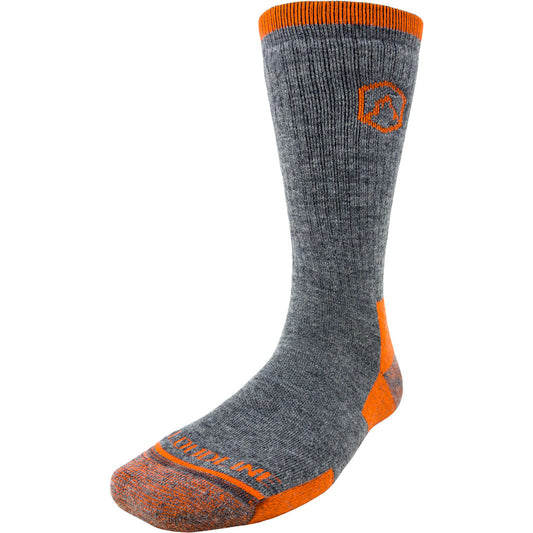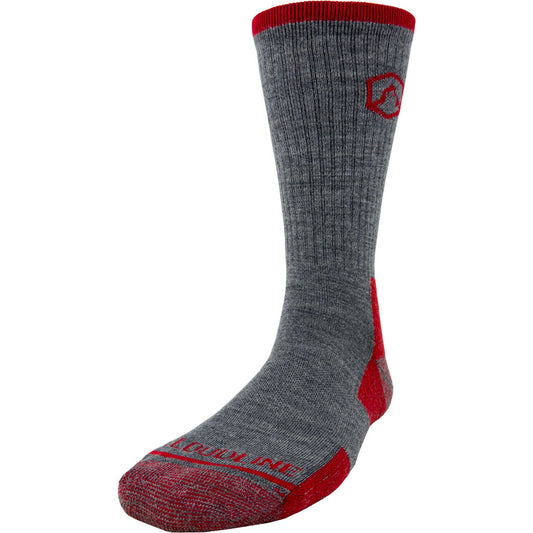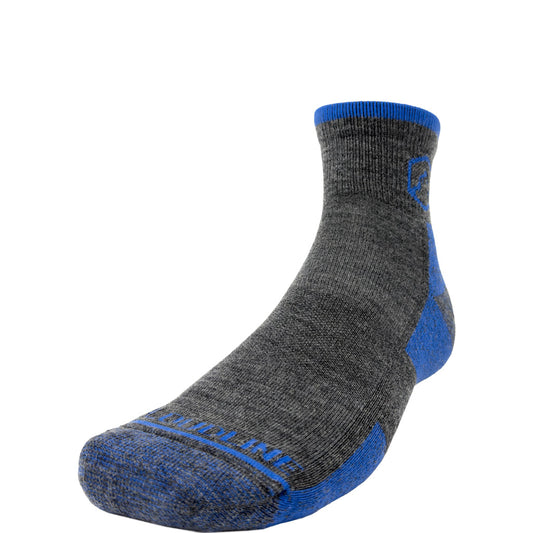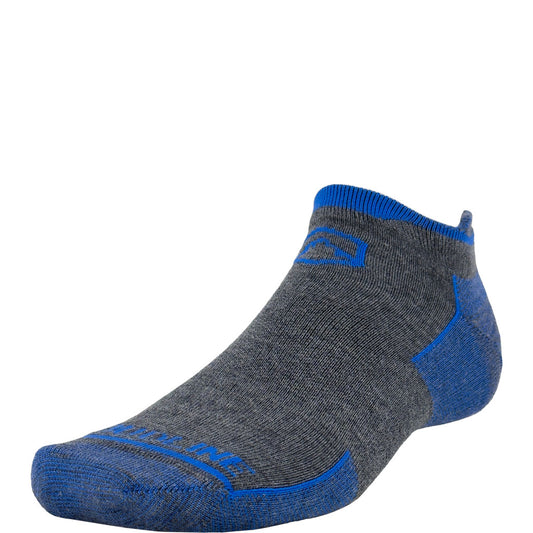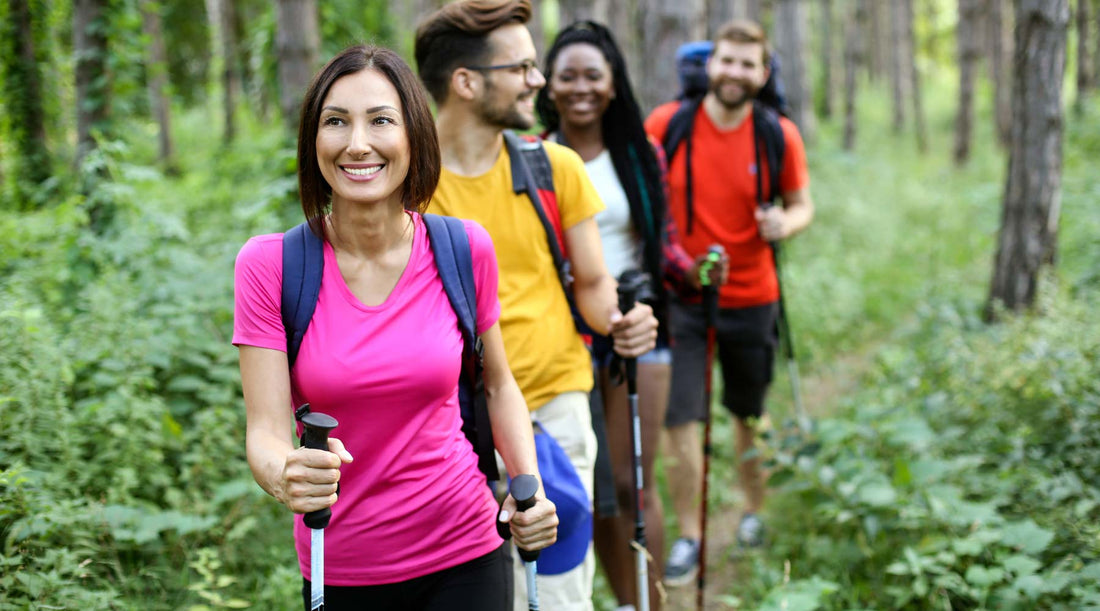
4 Self-Care Tips to Help You Get the Most Out of Your Outdoor Adventures
If you’re a hiker, backpacker, or any kind of outdoor enthusiast, you probably enjoy the health benefits that come with taking part in your favorite activities. Exercise, time in nature, and being active with friends are all healthy habits that contribute to your well-being.
But that doesn’t mean you’re immune to injuries, emergencies, and other dangerous situations. In fact, outdoor activities often come with a good deal of risk.
That’s why self-care is important for outdoor enthusiasts, too. Sure, taking a hike or spending a week in a tent is a form of self-care. But you definitely need to take good care of yourself if you like to push your limits on the trail and be safe while doing it.
That’s why we’ve put together this list of 4 self-care tips to help you get the most out of your outdoor adventures — to ensure you’re able to spend as much time outside as you like.
1. Stay Hydrated
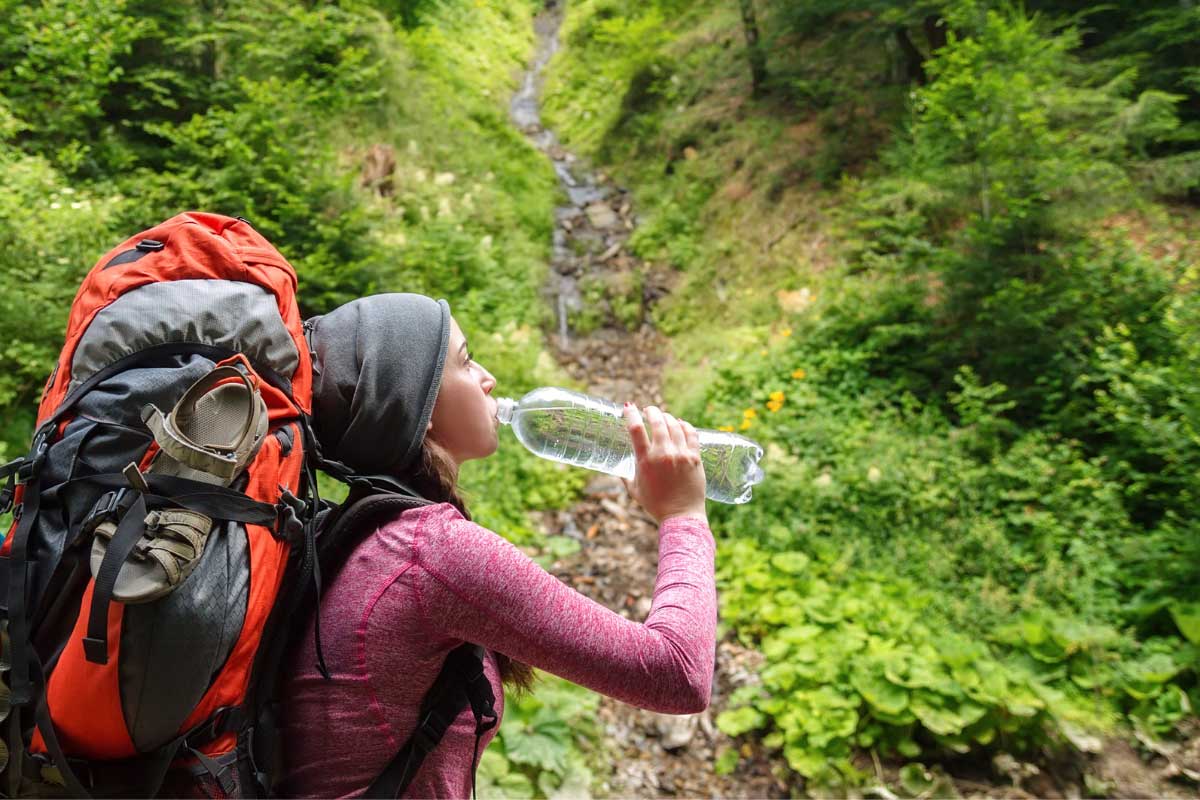
Everyone knows they should probably drink more water, but it’s another thing to actually make it a habit. Knowing some of the negative effects of dehydration might convince you to adopt more healthy hydration habits.
When you get dehydrated on the trail, you’re more likely to experience any of the following:
- Anxiety
- Fatigue
- Impaired flexibility
- Increased risk of injury
- Cramping
- Dizziness
- Loss of strength and stamina
- Confusion
Hydration is crucial for everyone, but outdoor adventurers should be especially mindful of their water intake. Working hard, sweating a lot, and spending time in sunny, dry, or high-elevation environments are all indicators you should be drinking more water.
Self-care tips for hydration:
- Try to drink at least two liters of water every day, whether you’re exercising or not. The actual amount of water your body needs depends on a lot of factors — both internal and external, so figure out how much water you need to feel your best. Two liters is a good place to start.
- Watch your caffeine intake before exercising. Caffeine — like your favorite cup of joe, makes you pee. Peeing more means your body is losing more water, increasing your risk of dehydration. You don’t have to cut out caffeine, just make sure you’re drinking water along with your morning coffee.
- Take consistent water breaks while out on a hike. Pay close attention to how you’re feeling, how much you’re sweating, and how often you’re peeing. (Hint: If you’re not peeing on a multi-hour hike, you’re probably not drinking enough water). And always take more water than you think you’ll need.
2. Eat Well
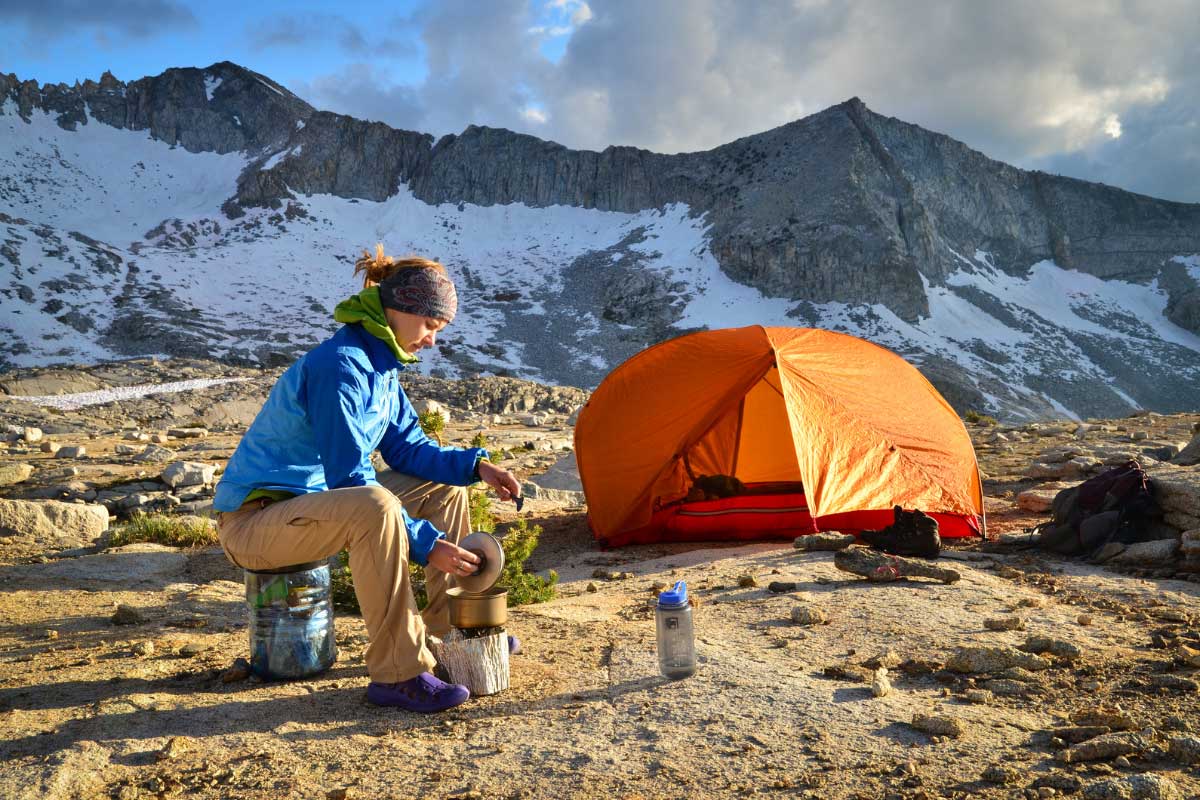
We can’t mention hydration as a form of self-care without talking about nutrition, too.
Many outdoor enthusiasts have some knowledge of basic nutrition. After all, it’s hard to enjoy your favorite outdoor activities when you’re not properly fueled. Calories translate to energy, which fuels you to finish that final, grueling mile.
Nutrition is important on and off the trail. Even though weight and space in your pack may limit what you choose to bring on a hike, bringing foods that fuel you and taste good is well worth the extra effort.
Self-care tips for eating well:
- Before your excursion, make sure you eat well. That means well-balanced meals packed with fruits, veggies, protein, and complex carbohydrates.
- On the trail, eat plenty of calories — and snack often. Bring foods packed with healthy fats, carbohydrates, and proteins. Try to choose as many whole foods as you can, and — though it sounds obvious — remember to eat when you’re hungry.
- After your outdoor adventure, refuel with the right foods. For instance, eating protein after a tough workout helps with muscle recovery. You should also eat foods containing carbohydrates to replenish your glycogen stores.
3. Stretch

When was the last time you had a good stretch? We all know how easy it is to blow it off after a long day outside — but it’s an important act of self-care that helps you recover and feel ready for your next adventure.
Stretching has lots of benefits, especially for those of us who spend a lot of time on the trail. Stretching can help:
- Prevent sore muscles
- Encourage blood flow
- Protect you from injury
- Reduce inflammation
- Increase your range of motion
Whether you enjoy steep, difficult hikes or casual walks in the woods, stretching contributes to feeling and performing well on the trail.
Self-care tips:
- Before your hike, stretch your calves, quads, glutes, and back. Hold each stretch for twenty seconds, breathing deeply. Resist pulling too hard or holding any position that feels painful.
- Throughout your hike, notice the parts of your body that feel tight. Pause a moment to stretch these muscles as often as needed. Again, don’t forget to hydrate consistently — it’ll help you avoid muscle cramping.
- After your exercise, do a full-body stretch. Spend extra time stretching the areas that feel sore. If you repeatedly notice problem areas despite thorough stretching, consider what might contribute to extra soreness in those spots. For example, if your shoulders are always painfully sore after hiking, you might double-check how your pack fits.
- On a regular basis (or as often as you like), practice yoga for increased flexibility and strength. Any kind of yoga will benefit you, but try a restorative or relaxing session after a hike to aid with recovery.
4. Get the Right Gear
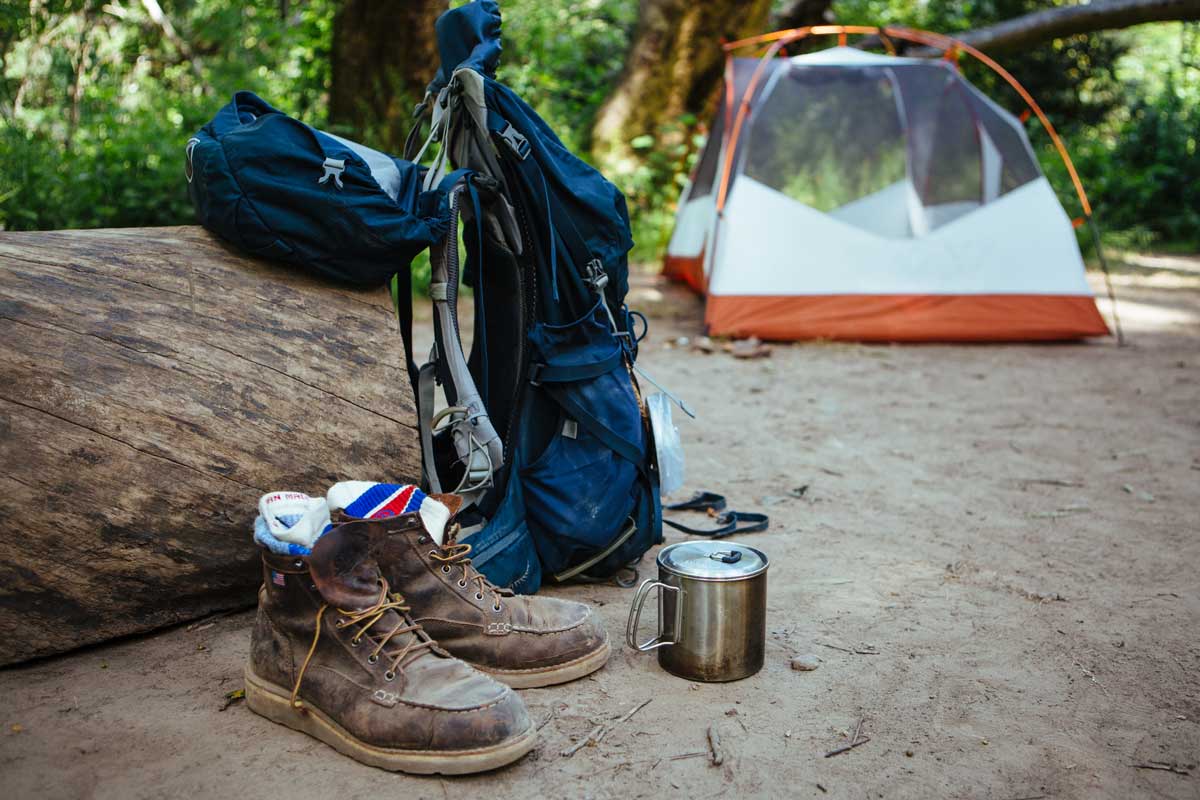
Hiking, backpacking, and other outdoor activities can put serious strain on your body. And while there’s no doubt you’re building strength and benefiting from exercise, you should still do what you can to protect your body from injury.
While stretching, hydration, and nutrition all help you feel your best, the gear you use on the trail also contributes to how you feel and how likely you are to experience an injury.
Some common hiking injuries and annoyances you can help prevent with the right gear include:
- Blisters
- Shoulder pain
- Back pain or soreness
- Knee pain
- Arch pain
- Sprains
We’re not suggesting you go out and spend a lot of money on all-new gear — but we do suggest you take these factors into account next time you do purchase or borrow gear.
Self-care tips:
- Avoid blisters: Blisters are a hiker’s worst enemy — and for good reason. They can bring any hike to a screeching halt. The key to avoiding blisters is wearing the right socks. Choose breathable, merino wool socks that fit your foot and don’t trap moisture.
- Wear the right footwear: In addition to your socks, your boots matter too. Find shoes that cushion your weight, allow your toes to spread naturally, feel secure, and give you the arch support you need.
- Prevent back pain: Start by making sure your backpack fits well. Pack it well, too, by putting the heaviest items near your back. Try to rest at least 70% of the pack’s weight on your hips by buckling your hip belt first. If you’re still struggling with shoulder or back pain after making these adjustments, ask an associate at an outdoor gear store to make sure your pack fits right.
- Get extra support: If you think you’d benefit from a little extra support on the trail, try hiking with trekking poles. They’re great for balance and posture — plus, they’re an absolute knee-saver on steep, downhill sections of trail.
Self-care is important on and off the trail.
If you value spending time outside, self-care is non-negotiable. Proper hydration, nutrition, stretching, and proper gear can make all the difference between a fun day on the trail and a month spent recovering from an ill-timed injury. So keep up the adventures, and take care of yourself along the way.
Want even more tips for enjoying your outdoor adventures to the fullest? Subscribe to our newsletter, and we’ll bring our favorite outdoor tips — and of course, deals — straight to your inbox.

